Did Man really Landed on MOON ???.. A Mystery
This mystery hasn’t ended up still.But certain doubts raised from the fact file has subsequently raised eye brows and insist to question “Did Man really landed on Moon?”
Apollo 11 was the first manned mission to land on the Moon. It was the fifth human spaceflight of the Apollo program, and the third human voyage to the moon. Launched on July 16, 1969, it carried Commander Neil Armstrong, Command Module Pilot Michael Collins and Lunar Module Pilot Edwin ‘Buzz’ Aldrin. On July 20, Armstrong and Aldrin became the first humans to land on the Moon, while Collins orbited above.
The mission fulfilled President John F. Kennedy’s goal of “landing a man on the moon and returning him safely to the Earth” by the end of the 1960s.
Primary crew of the mission :
- Neil Armstrong, commander
- Michael Collins, command module pilot
- Edwin ‘Buzz’ Aldrin, lunar module pilot
Image 1
Buzz Aldrin poses on the Moon allowing Neil Armstrong to photograph both of them using the visor’s reflection.
Image 2
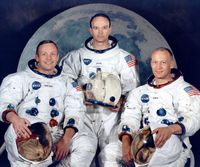
L-R: Armstrong, Collins and Aldrin
Image3
The historical plaque on the ladder of Apollo 11′s lunar module “Eagle”, still remaining on the Moon.
Image4
Neil Armstrong works at the LM in one of the few photos taken of him from the lunar surface.
So now the discussion starts…, protuding certain real proofs that the mission is FAKE and no men landed on moon yet.
Proof 1
Proof 2
Proof 3
Proof 4
Proof 5
Proof 6
Proof 7
Facts about the Moon
An average days temperature on the moon ranges from 260 degrees F to 280 degrees F, too (hot) for film to survive. At those temperatures, film crinkles up into a ball.
The mid-day temperature on the moon is indeed around 260 degrees Fahrenheit, however, the low temperature in the dark of night is about minus 250 degrees Fahrenheit! The lunar landings and following exploration was done when the sun was low, within a day or so of local sunrise at the landing site at the time of the landing, so that temperatures were actually quite moderate, even after a full 3 days on the lunar surface. The film in the cameras was also kept in magazines that provided some protection from the extreme temperatures even when left in direct sunlight. In a vacuum without an atmosphere to conduct heat, film inside the magazines it was carried in is quite well protected from the heat of direct sunlight.
About 20 miles about [sic] the Earth, there is a radiation belt named the Van Allen belt. No human can get through this belt, If you try than you get hit with 300+ rads of radiation. Unless they are surrounded on each side by 4 feet on lead.
In fact, the Van Allen radiation belts extend from about 600 miles up to more than 40,000 miles from Earth with the region of highest radiation intensity being between around 2,000 miles and 12,000 miles above Earth. The astronauts exposure to those radiation belts is brief (less than 4 hours total - they begin their time in this region while traveling at 25,000 MPH! And they pass through it twice, once outbound, and again on their return. They spend less than an hour in the densest part of the belt.) and they are well protected in their spacecraft. Here is a link to a webpage that describes the radiation environment and physiological effects on the Apollo astronauts.
Also, the belt is toroidal in shape (like a donut) and the trajectories of the Apollo spacecraft were designed to avoid the worst part of the Van Allen belts. Even the discoverer of the Van Allen belts, Professor James A. Van Allen, has noted that the belts would not have been dangerous to the Apollo astronauts given their trajectories and their spacecraft.
There are millions of micro-metors [sic] traveling at speeds up to 6000 MPH, which would tear the ship to pieces.
In fact there are many more than "millions" of bits of would be meteors out in space, and they travel at speeds as high as at least 120,000 MPH! Despite the large numbers and high speeds, the space density of these objects is quite low so the average interval between impacts on an astronaut is extremely low. The spacesuits the astronauts wore on the lunar surface had layers designed to stop such small particles (we're talking micron sized bits!) to protect the astronaut.
If you look at the pictures/video of people on the moon, you will never see more than 3 stars.
See our earlier discussion on stars in lunar images. Briefly, the images are exposed for the daylight scenes and star images are badly underexposed and therefore not visible. And wait, I thought they didn't show any stars? (see the early discussion by this TMLWFer.)
When the LEM set down on the Lunar surface, it gave out 3000 lb. worth of thrust. This would have created a massive hole underneath the Lunar Module, but in pictures of the Lunar Module, the ground underneath is untouched.
On the contrary, there are many photographs which show the disturbance of the lunar soil under or near the Lunar Module. For example, see AS11-40-5892 or AS11-40-5921 (from the ALSJ ) which shows not only some discoloration under the descent engine, but also some radial disturbance in the soil from the outward blast. Also, see AS12-46-6781 which shows a trail of disturbed soil along the ground track of the Apollo 12 lunar module. On the left edge of this frame is the TV camera with some footprints right next to the small crater. The engine exhaust trail goes almost straight across the lower part of the image, about a quarter of the way from the bottom of the frame. There is some disturbed soil caused by an astronaut's footprints that angles diagonally across the exhaust trail, meeting it at the right edge of the image. If the landings were faked, placing a blast crater under the LM would be the most obvious thing to do in order to "fool" the unwitting public. In fact, there was plenty of dust, but the moons' regolith is rather densely packed due to billions of years of gardening and a lack of air on the moon.
Also, the expectation of having a blast crater (presumably looking like a fresh impact crater?) under the LM is flawed. Does a garden hose sprayed at high pressure into the dirt create a blast crater? It surely blows the surface dirt in a radial direction and will clear out a small hole, but not a blast crater (like an explosion of dynamite, perhaps?). There is even an Earthly example of a rocket landing on dirt. The DC-X was a test flight program of a vertical takeoff and landing rocket. On one of its last flights, it made an emergency landing outside of the pad area. Despite the hydrogen/oxygen engine producing a thrust of some 60,000 pounds (about 20 times the thrust of the LM descent engine!), the engine produced a mark on the desert floor that was barely recognizable. Given that the descent stage engine bell is about 5 feet across at the bottom, and that thrust of the engine at touchdown was about 3,000 pounds, that blast pressure of the rocket exhaust was only about 1 pound per square inch - not much different from the pressure caused by the weight of an astronaut on the Moon standing on one foot while walking across the surface.
But why would they do it?
ATTENTION. If you ever saw the movie "Wag the Dog", the president has sexual relations with a 12 year old. This information goes out to the media 1 week before elections. So, to get the publics mind off of the little Girl, the president stages a war with Albania. The moon shots were the same concept. People did not like what was going on with the Vietnam war, so, to get the publics mind off of all the bad things going on in Vietnam, the US faked a moon landing. If you check your dates, we abruptly stopped going to the moon around the same time the Vietnam War Ended.
TO WIN THE SPACE RACE -- Back in the late 60's early 70's, Russia and the US were in a heated battle to see, well, pretty much who was better. Once the US realized that they couldn't send a man to the moon, they couldn't just say, "OK Russia, we give up."
MONEY. NASA gathered about 30 billion dollars pretending to go to the moon. That means that someone is getting a lot of money in their pockets.That would be all of the aerospace companies and their workers who built the rockets, spacecraft, rovers, spacesuits, launchpads, etc. as well as those who supplied them with the raw materials they needed. We spent that money on our own people - not one cent was spent in space or on the Moon. It's been said that for every penny invested, we got something like 7 cents back in spinoffs, including jumpstarts on integrated circuit technology (and ultimately therefore, the computer you are using to read this webpage), component miniaturization, materials science and a long list of other items. These things would have been developed anyway, most likely, but their use in the Apollo program sped their developement up a great deal.
Check the dates and facts a little more closely. Plans to end the Apollo moon landings were already in the works by the time we made our first landing in 1969 - years before the end of the war in Vietnam was even in sight. Our first lunar exploration ended far from abruptly. It was planned well in advance. There were originally moonlandings planned through Apollo 20, but first Apollo's 19 and 20 were cut, then Apollo 18, making Apollo 17 our last lunar landing of the 20th Century. The Apollo program was initiated before the U.S. was substantially involved in Vietnam, and more than 4 years before it could be considered a war. Apollo grew out of a cold war conflict over the minds and opinions of our technological prowess in the world and its eventual success was due to the hard work and sacrifice of literally 100's of thousands of people who built the Saturn V rocket and the Apollo spacecraft. Tell them that their work was some elaborate hoax.
And the Russians are going to roll over and go along with the hoax? It would have been fairly easy to discredit the Apollo missions in real-time if they were truly being faked so that an embarrased Soviet government would be able to expose it rather than decide to cover up their own failed attempts to get to the Moon. (They claimed at the time to not have been trying to land men on the Moon, but we now know that they in fact had a very agressive manned Lunar program.)
yours

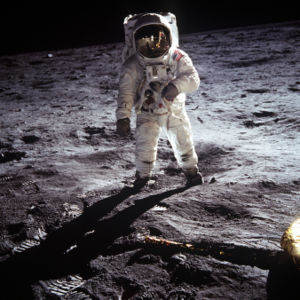
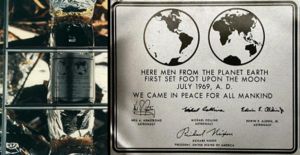
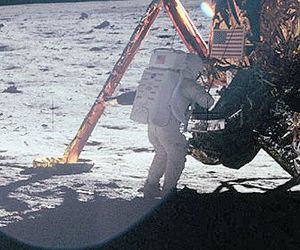
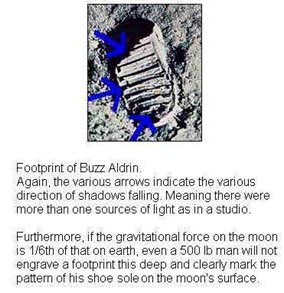
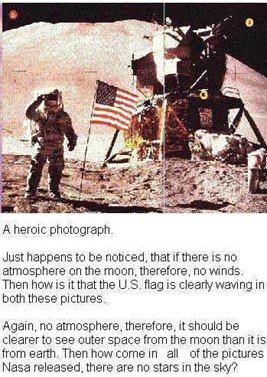
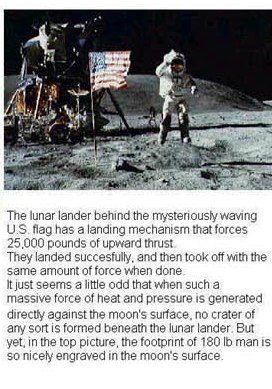
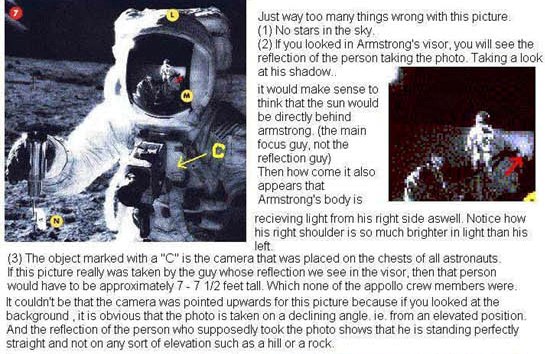
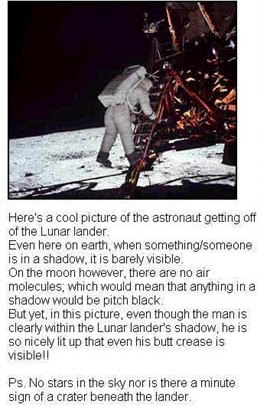
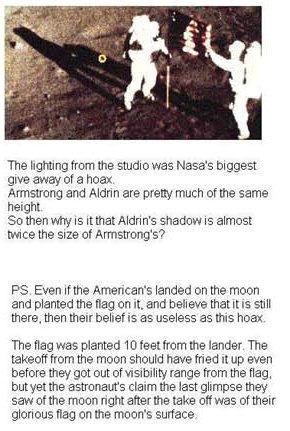

No comments:
Post a Comment